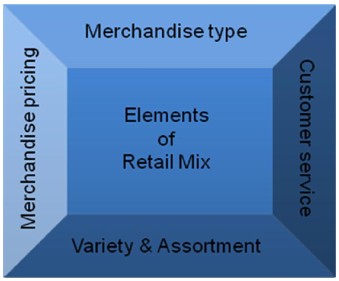The strategic planning by the top management derives the Retail-mix of the firm. Retail-mix is the combination of overall set of offerings by the retailer. The basic characteristic of a retailer are determined by its Retail Mix. Following are the elements of Retail-mix.

Type of merchandise sold
The type of merchandise offered should be in line with the target market.
Based on the type of merchandise offered, retailers can be of the following types:
- Apparel and accessories
- Auto dealer, Gas stations
- Building material / hardware store
- Drug stores
- Food stores
- Fuel dealers
- General merchandise
- Home furniture and furnishings
- Liquor stores
- Miscellaneous stores
- Service retailers like restaurants, car dealers
But the degree to which retailers compete with each other isn’t simply based on the similarity of the merchandise. The variety and assortment of merchandise they offer and the service
provided also determines the competition.
Variety and Assortment
Variety denotes the breadth of the merchandise carried by the retailer, while assortment is the
depth of merchandise. Variety refers to the number of merchandise categories offered by retailer and assortment is the number of different items in a merchandise category. A category is an assortment of items that the customer sees as reasonable substitutes of each other. All the products in a category have similar characteristics and are targeted at a specific segment. E.g. Girl’s apparel, boys’ apparel and infants’ apparel are different categories.
Level of Customer service
Though the manufacturer provides only the product, the retailers provide all other related services to the customers. Customers expect retailers to provide services like parking, comfortable ambience, appealing display of merchandise, gift-wrapping, home delivery of items etc. Some retailers charge for the services provided while some provide these facilities free. Price & level of service normally have an inverse relation. In classifying the retailers, service also plays an important role.
Pricing of the merchandise
Price acts as a major differentiator factor in retail. For example, discount stores appeal to the customers who are looking for low prices and less interested in service & variety or assortment of the merchandise. Offering more sizes, colours, and brands, making the store ambience more attractive, employing knowledgeable sales people increases the cost.
Some retailers save on such costs, which allow them to sell their merchandise at a comparatively lower price.
Apply for Real Estate Certification Now!!
https://www.vskills.in/certification/certified-multichannel-retail-professional

